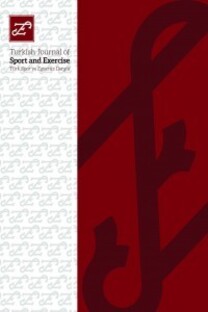The Effect of Aerobic Training Program on Cardiopulmonary Parameters and Oxygen Saturation in Elite Judokas
The aim of this study is to examine the effect of aerobic training program on cardiopulmonary parameters and oxygen saturation in elite judokas. Total of 22 male elite judokas, aged between 18 and 25 participated in the study voluntarily. Subjects were randomly divided into two groups as experimental group (n=11, age:21.60±2.06) and control group (n=11, age:20.50±1.77). The experimental group was given an aerobic exercise program for 3 days a week for 8 weeks. Before and after the aerobic exercise program, body weight, body mass index (BMI), body fat percentage (BF%), systolic blood pressure (SBP), diastolic blood pressure (DBP), resting heart rate (RHR), maximal heart rate (HRmax), maximal work rate (WRmax), maximal minute ventilation (VEmax) and maximal oxygen consumption capacity (VO2max) were measured. Individual oxygen consumption capacities were determined using the Ramp protocol in the gas analysis system. Paired Sample t test was used for intra-group comparison and Independent Sample t test was used for statistical analysis of the data. The level of significance was determined as p<0.05. When the pre-test and post-test results of the aerobic training program applied to the experimental group were compared, p<0.05 significance was found in the experimental group, SBP, DBP, RHR, HRmax, %BF, VO2max, WRmax, VEmax and SpO2 values. Significant differences were found between the groups in favor of the experimental group (p<0.05) for SBP, DBP, RHR, HRmax, WRmax, VEmax, VO2max and SpO2 values. It can be said that the aerobic training program applied to the judokas has a positive effect on cardiopulmonary parameters and oxygen saturation.
Keywords:
Aerobic training Judo, Cardiopulmonary parameters,
___
- Acartürk E. KOAH Hastalarındaki Oksijen Satürasyonunun Pulse Oksimetre ile Tesbitinin Arter Kan Gazı Tetkiki ile Korelasyonu ve Bu Korelasyonu Etkileyen Faktörler. Uzmanlık Tezi, Süreyyapaşa Göğüs Kalp ve Damar Hastalıkları Eğitim ve Araştırma Hastanesi, İstanbul, 2009.
- Ağaoğlu SA, İmamoğlu O, Kishalı NF. Türk Erkek Milli Judo Takım Sporcularının Belirli Fizyolojik ve Antropometrik Özelliklerinin İncelenmesi. Atatürk Üniversitesi Beden Eğitimi ve Spor Bilimleri Dergisi, 2001; 1:59-57.
- American Thoracic Society American Collge of Chest Physicians. Am J Respir Crit Care Med. 2003; 167, 211-277.
- Ardıç, F. Egzersiz reçetesi. Türkiye Fiziksel Tıp ve Rehabilitasyon Dergisi, 2014; 60, 1-8.
- Blumenthal JA, Sherwood A, Gullette ECD, Babyak MA, Waugh R, Georgiades A, Craidhead LW, Tweedy D, Feinglos M, Appelbaum M, Hayano J, Hinderliter A. Exercise and weight loss reduce blood pressure in men and women with mild hypertension. Arch Intern Med, 2000; 160(13):1947-58.
- Claessens A, Beunen G, Wellens R, Geldof G. Somatotype and Body Structure of World Top Judoists, J Sports Med Phys Fitness. 1987;27:105- 112.
- Cox JC. Traditional Asian martial arts training: a review. Quest, 1993; 45;366-388.
- Daglioglu O, Mendes B, Bostanci O, Ozdal M, Demir T. The Effect of Short-Term Exercise on Oxygen Saturation in Soccer Players. Australian Journal of Basic and Applied Sciences, 2013; 7(10): 446-449.
- Daglioglu O. (a). The effect of 8-week submaximal aerobic exercise on cardiovascular parameters and body composition in young men. International Journal of Acdemic Reseach, 2013; 5(4), 210-216.
- Daglioglu O. (b). The effect of gradually increasing exercise on oxygen consumption and lactate levels in swimmers. Annals of Biological Research, 2013; 4(10):96-102.
- Faude O, Meyer T, Rosenberger F, Fries M, Huber G, Kindermann W. Physiological characteristics of badminton match play. European j. Applied Physiology, 2007; 100:4, 479-485.
- Fox Bowers Foss. Beden Eğitimi ve Sporun Fizyolojik Temelleri, Ankara: BağırganYayınevi, 1999.
- Gücenmez E, Dağlıoğlu Ö, Dağlıoğlu T. The Effect of Aerobic Exercise on Oxygen Consumption Capacities and Body Composition in Football Players, Atabesbd, 2017; 19(4):136-147.
- Ingham SA, Carter H, Whyte GP, Doust JH. Comparison of the oxygen uptake kinetics of club and olympic champion rowers. Medicine and science in Sports and Exercise, 2007; (5):865-871.
- Koç H. Aerobik antrenman programının erkek hentbolcularda bazı dolaşım ve solunum parametrelerine etkisi. Selçuk Üniversitesi Beden Eğitimi ve Spor Bilim Dergisi, 2010; 12(3):185-190.
- McArdle WD, Katch FI, Katch VL. Exercise Physiology. 3 rd ed. Lea & Febiger, Philadelphia, 1991:278-284.
- Özdal M, Dağlıoğlu Ö, Demir T, Özkul N. Aerobik Antrenmanın Arteriyel Hemoglobin Oksijen Satürasyonu Üzerine Etkisi, Spor ve Performans Araştırmaları Dergisi, 2013; 5(1):27-34.
- Pichurko BM. Exercising your patient: which test(s) and when? Respir Care, 2012; 57: 100-10.
- Saltin, B. Training for anaerobic and aerobic power. In McArdle WD, Katch FI, Katch VL, (eds.). Exercise physiology Energy, Nutrition & Human Performance (6th ed.) Baltimore: Lippincott Williams & Wilkins, 2007: 469-508.
- Stewart KJ, Bacher AC, Turner KL, Fleg JL, Hess PS, Shapiro EP, Tayback M, Ouyang P. Effect of exercise on blood pressure in older persons: a randomized controlled trial. Arch Intern Med, 2005; 165(6): 756-62.
- Tamer K. Measurement and Evaluation of Physical-Physiological Performance in Sports, Bağırgan Publishing, Ankara, 2000.
- Ulubay G, Oner Eyüboğlu F. Cardiopulmonary exercise testing. Tuberk Toraks, 2006; 54: 90-8.
- Vargo L, Sanderson S. Compression stockings and aerobic exercise: A Meta-Analysis. Sport and art, 2014; 2(4), p. 68-73.
- Wasserman K, Hansen JE, Sue DY, Stringer WW, Whipp BJ. Principles of Exercise Testing and Interpretation. 4th ed. Philadelphia, Pa: Lippincott Williams & Wilkins, 2004.
- Zetaruk MN, Violan MA, Zarakowski D, Micheli LJ. Karate Injuries in children and adolescents, Accident Analysis and Prevention, 2000; (32), 421-425.
- Başlangıç: 1999
- Yayıncı: Selçuk Üniversitesi, Spor Bilimleri Fakültesi
Sayıdaki Diğer Makaleler
Analysis of sports management students’ opinions on project-based learning
Harun GENÇ, İdris KAYANTAŞ, Gökmen KILINÇARSLAN, Akan BAYRAKTAR
Murat ATASOY, Ebru Olcay KARABULUT, Levent VAR
İbrahim BOZKURT, Mehmet Özdemir, Ramazan TOPUZ
The comparison of tibial torsion angles between elite athletes and sedentary people
Ahmet BAYRAK, Galip Bilen KÜRKLÜ, Işık TUNCER, Melda Pelin YARGIÇ
Serkan HAZAR, Ercan POLAT, Zekihan HAZAR
The effect of physical activity on level of anger among individuals with autism
İbrahim BOZKURT, Mehmet Özdemir, Mehmet ILKIM, Halil TANIR
Çağrı Hamdi ERDOĞAN, Ramazan TOPUZ, Ziya BAHADIR
Technical analysis of 2007 and 2017 World Taekwondo Women and Men championship finals
